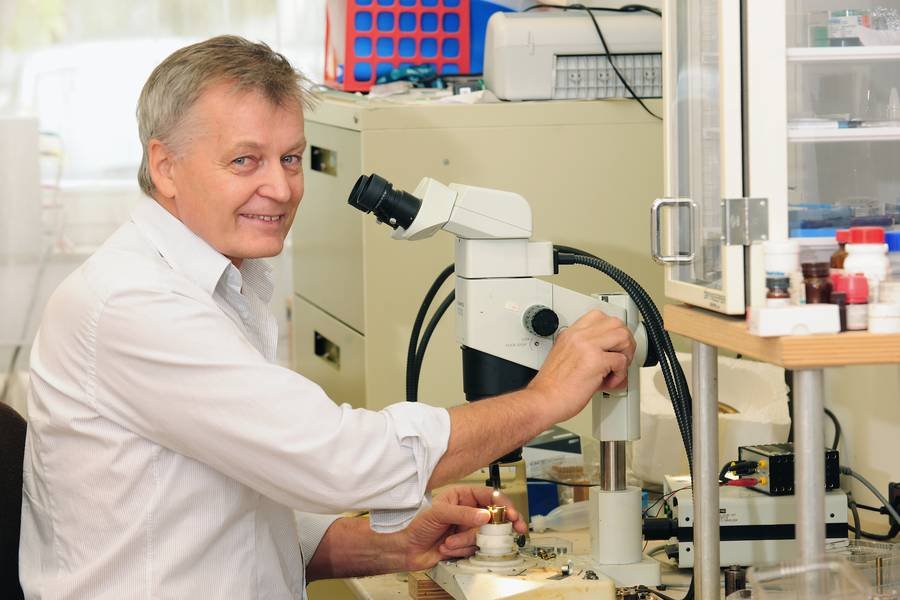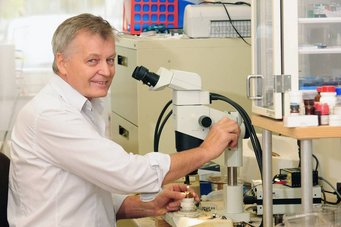With relentless pressure towards superconductivity: Award for Max Planck scientist and new insights
Mikhail Eremets from the Max Planck Institute for Chemistry is honored for his accomplishments in high-pressure research with the Bridgman Award and demonstrates progress in synthesizing metallic hydrogen.
The Mainz-based physicist Mikhail I. Eremets was honored with the Bridgman Awarded during the 26th Conference of the International Association for the Advancement of High Pressure Science and Technology (AIRAPT). The prize, one of the most prestigious in the field of high-pressure sciences, was awarded mid-August in the Chinese capital Beijing. Eremets received the award for his excellent work and technical developments in the field of high-pressure research.

Mikhail Eremets has been researching at the Max Planck Institute for Chemistry in Mainz since 2001. He leads the 'High-Pressure Chemistry and Physics' Group, which studies matter under extremely high pressures. In the summer of 2015 he published a scientific paper in the high valued journal “Nature”, in which he describes how hydrogen sulfide conducts electricity with no resistance at 70 degrees Celsius and a pressure of 1.5 million bar. This represented not only a superconductivity record for Eremets himself, but also points the way to a possible new method for the loss-free transmission of electricity at room temperature.
Mikhail Eremets is currently working on the important subject metallic hydrogen. Recently, he published a paper (arXiv:1708.05217), in which he shows that his team may have already achieved a metallic hydrogen state. In the experiments, however, hydrogen does not abruptly transition to the atomic metallic state, as was predicted more than 80 years ago. Instead, it remains in molecular form and only gradually changes from a semimetallic state into a metal when the pressure is increased. The next aim of Mikhail Eremets' team is to achieve pressures greater than five million bar, at which point metallic hydrogen should become a high-temperature superconductor.
Vitae
Michail Ivanovitsch Eremets was born in 1949 in the Pinsk region of Belarus. He studied physics at the Moscow Engineering Physics Institute and gained his doctorate in 1978 at Moscow's Institute of General Physics of the Russian Academy of Sciences. He went on to perform research at the High-pressure Physics Institute of the Russian Academy of Sciences in Troitsk, where he eventually headed the high-pressure physics department as director. After 1991 he worked in the world's leading high-pressure laboratories: France (Paris University), Japan (NIMS and Osaka University), USA (Geophysical Laboratory), UK (Clarendon Laboratory) and others. From 2001 until today, Mikhail Eremets has been researching at the Max Planck Institute for Chemistry in Mainz, Germany, and leads the 'High-pressure Chemistry and Physics' Working Group. In 2010, he was awarded the European Research Council's 'Advanced Grant' for research into conductive and metallic hydrogen, which is endowed with1.9 million euros. The Rome International Center for Materials Science of Superstripes (RICMASS) awarded him the Ugo Fano Medal in late 2015 for his basic research work in the field of high-pressure chemistry and for discovering the superconductivity of hydrogen sulfide at record temperatures. In January 2016, he was awarded an honoris cause doctorate by the University of Leipzig.
Bridgman Award
The International Association for the Advancement of High Pressure Science and Technology (AIRAPT) grants the Bridgman Award every two years on outstanding scientists in the field of high-pressure research. The prize is named after the US physicist Percy Williams Bridgman. Bridgman was awarded the Nobel Prize for Physics in 1946 for his work in the field of high-pressure physics. He was one of the founders of modern high-pressure research.
